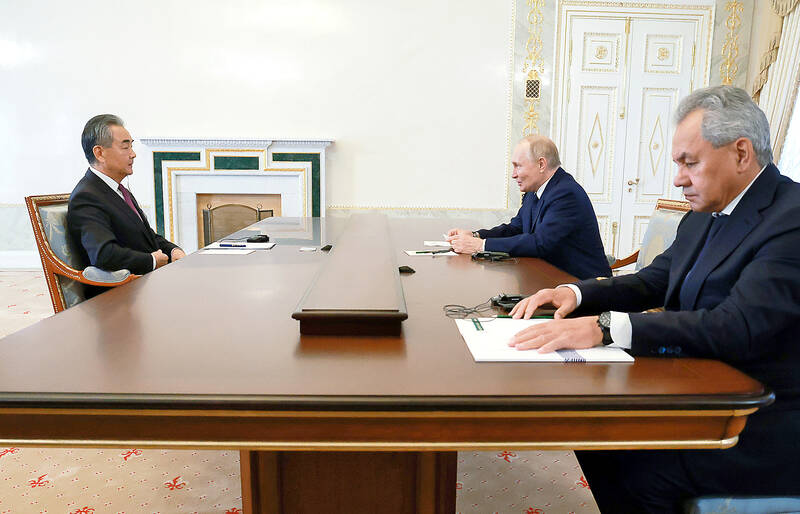Chinese President Xi Jinping (習近平) is to visit Russia next month for a summit of the BRICS bloc of developing economies, Chinese Minister of Foreign Affairs Wang Yi (王毅) said on Thursday, a move that comes as Moscow and Beijing seek to counter the West’s global influence.
Xi’s visit to Russia would be his second since the Kremlin sent troops into Ukraine in February 2022. China claims to take a neutral position in the conflict, but it has backed the Kremlin’s contentions that Russia’s action was provoked by the West, and it continues to supply key components needed by Moscow for weapons production.
Wang Yi met with Russian President Vladimir Putin in St Petersburg on Thursday and the two hailed ties between the two countries.

Photo: EPA-EFE
Wang said that Xi “happily accepted” Putin’s invite to attend the BRICS summit in the Russian city of Kazan next month.
Putin, in turn, announced that the two would also sit down for a bilateral meeting in Kazan and discuss various aspects of the Russia-China relations, which “are developing quite successfully” and “in all directions.”
Xi last visited Russia in March last year and Putin reciprocated with his own trip to China in October that year.
The two leaders have since also met in Beijing in May, where Putin took the first foreign trip of his fifth presidential term, and in Kazakhstan in July.
The BRICS alliance was founded in 2006 by Brazil, Russia, India and China, with South Africa joining in 2010.
It has recently undergone an expansion and now includes Iran, Egypt, Ethiopia and the United Arab Emirates.
Saudi Arabia has said it is considering joining, and Azerbaijan and Malaysia have formally applied.
BRICS has a stated aim to amplify the voice of major emerging economies to counterbalance the Western-led global order.
Its founding members have called for a fairer world order and the reform of international institutions like the UN, the International Monetary Fund and the World Bank.

The collapse of the Swiss Birch glacier serves as a chilling warning of the escalating dangers faced by communities worldwide living under the shadow of fragile ice, particularly in Asia, experts said. Footage of the collapse on Wednesday showed a huge cloud of ice and rubble hurtling down the mountainside into the hamlet of Blatten. Swiss Development Cooperation disaster risk reduction adviser Ali Neumann said that while the role of climate change in the case of Blatten “still needs to be investigated,” the wider impacts were clear on the cryosphere — the part of the world covered by frozen water. “Climate change and

Poland is set to hold a presidential runoff election today between two candidates offering starkly different visions for the country’s future. The winner would succeed Polish President Andrzej Duda, a conservative who is finishing his second and final term. The outcome would determine whether Poland embraces a nationalist populist trajectory or pivots more fully toward liberal, pro-European policies. An exit poll by Ipsos would be released when polls close today at 9pm local time, with a margin of error of plus or minus 2 percentage points. Final results are expected tomorrow. Whoever wins can be expected to either help or hinder the

DENIAL: Musk said that the ‘New York Times was lying their ass off,’ after it reported he used so much drugs that he developed bladder problems Elon Musk on Saturday denied a report that he used ketamine and other drugs extensively last year on the US presidential campaign trail. The New York Times on Friday reported that the billionaire adviser to US President Donald Trump used so much ketamine, a powerful anesthetic, that he developed bladder problems. The newspaper said the world’s richest person also took ecstasy and mushrooms, and traveled with a pill box last year, adding that it was not known whether Musk also took drugs while heading the so-called US Department of Government Efficiency (DOGE) after Trump took power in January. In a

It turns out that looming collision between our Milky Way and Andromeda galaxies might not happen after all. Astronomers on Monday said that the probability of the two spiral galaxies colliding is less than previously thought, with a 50-50 chance within the next 10 billion years. That is essentially a coin flip, but still better odds than previous estimates and farther out in time. “As it stands, proclamations of the impending demise of our galaxy seem greatly exaggerated,” the Finnish-led team wrote in a study appearing in Nature Astronomy. While good news for the Milky Way galaxy, the latest forecast might be moot